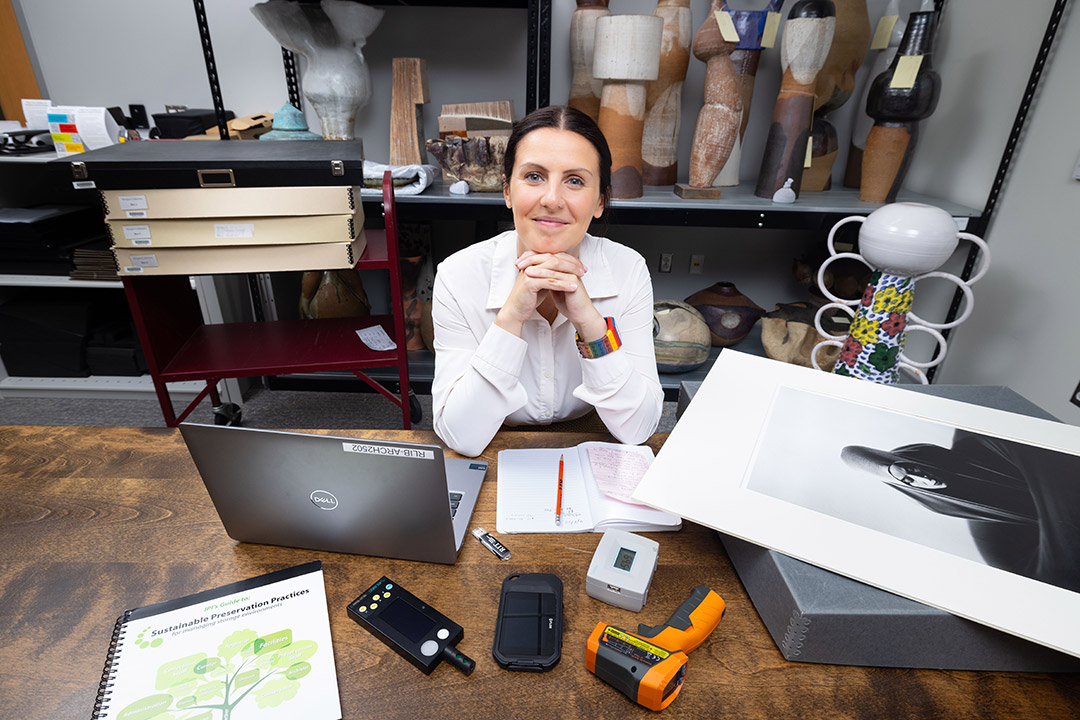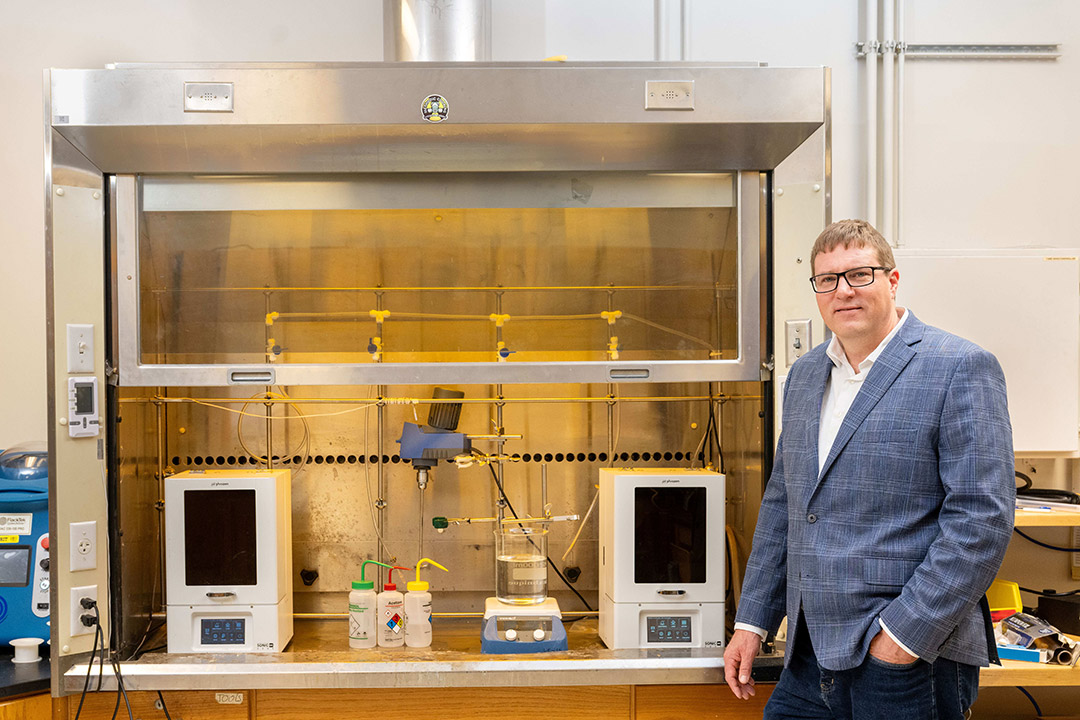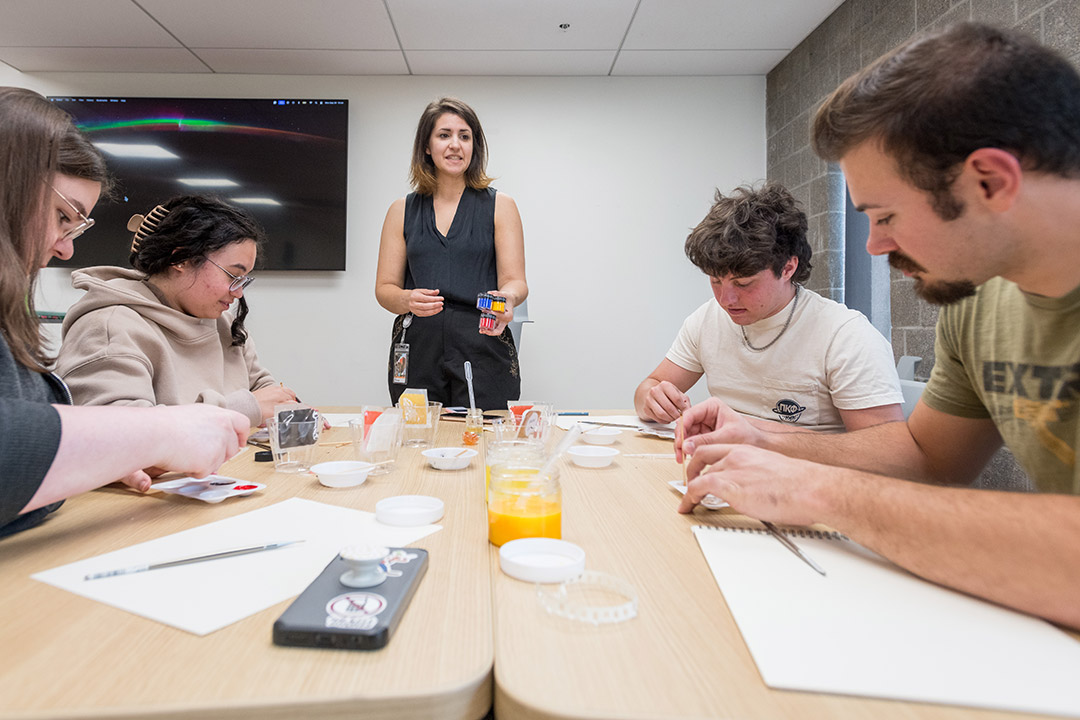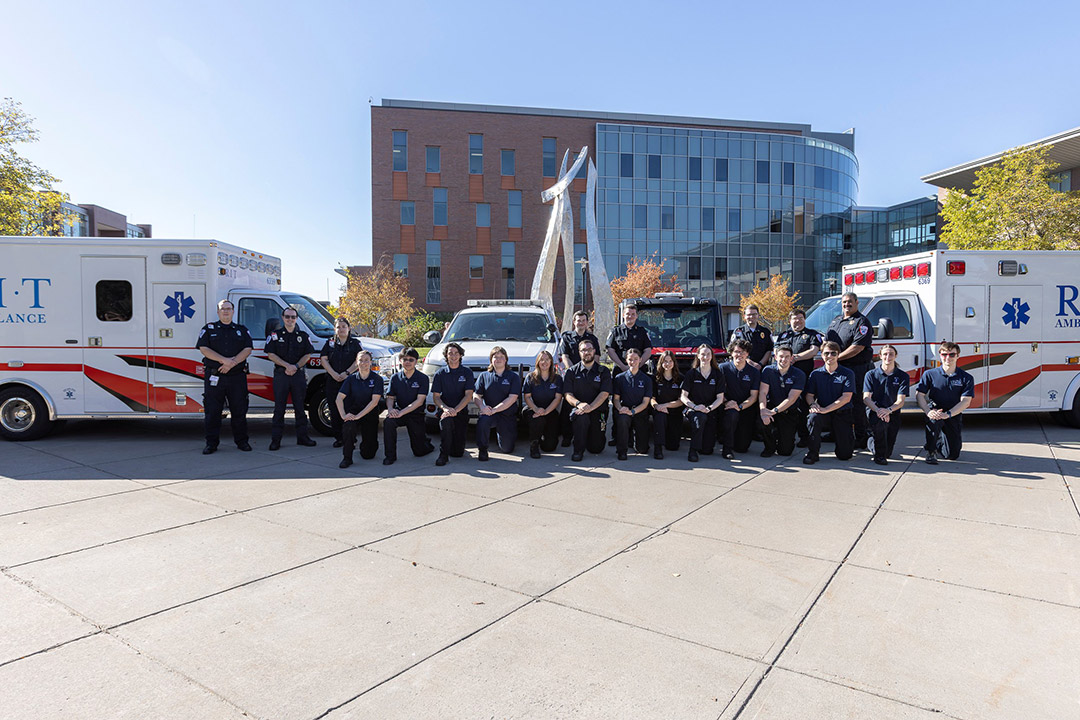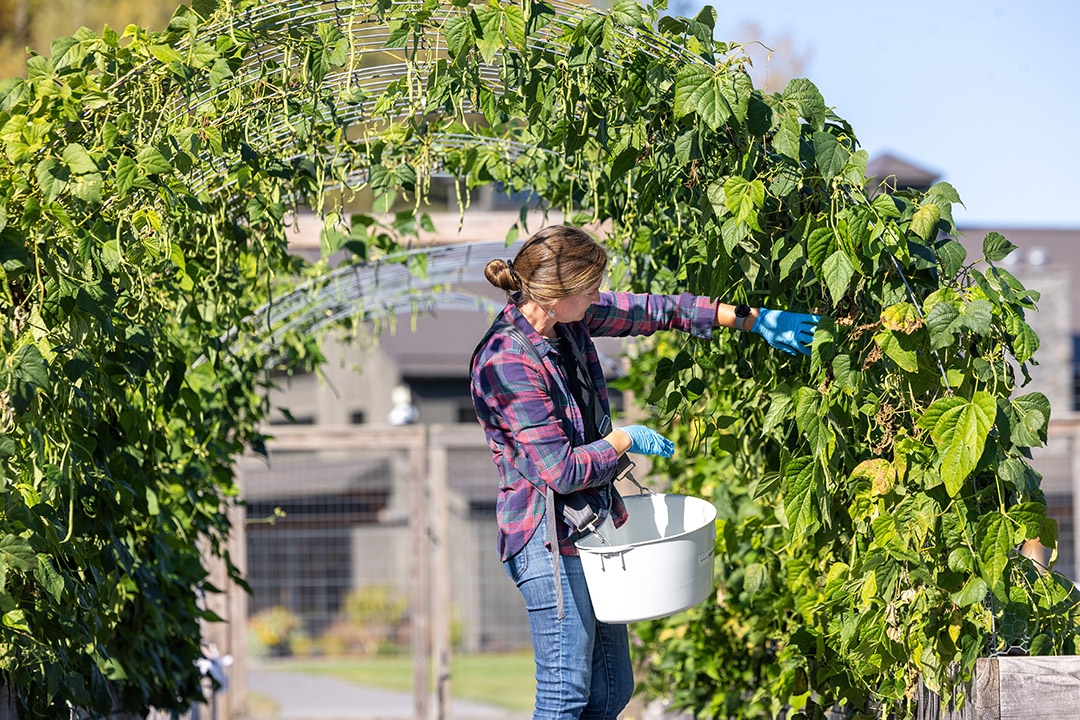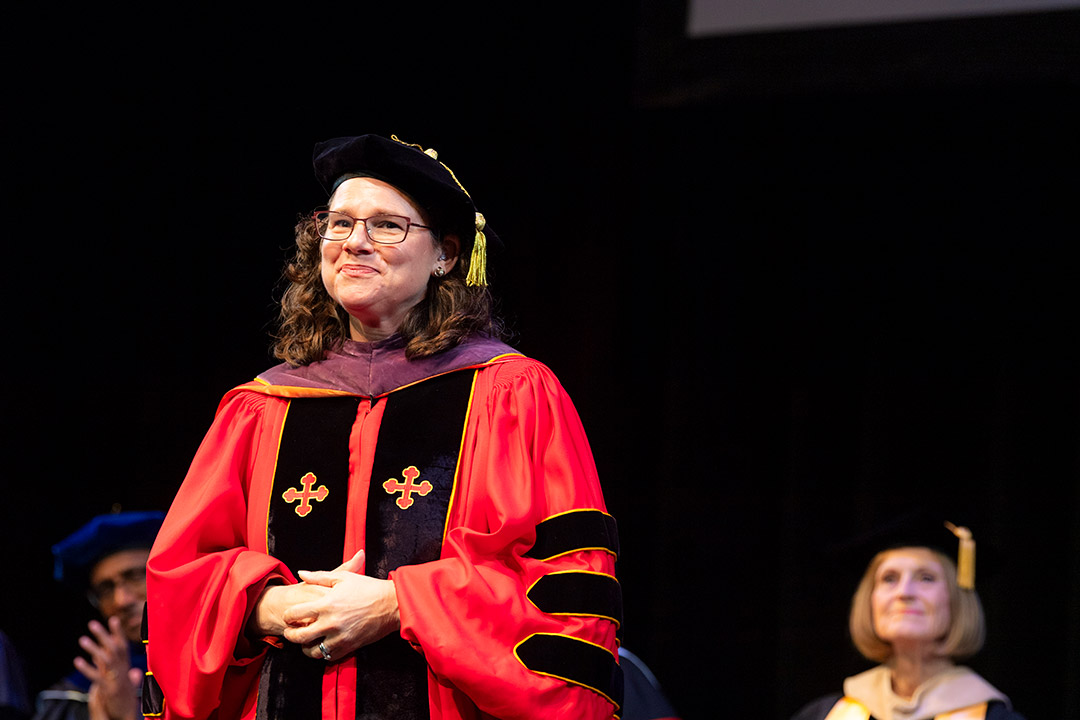RIT preservation specialist empowers cultural heritage institutions to adopt sustainable practices
Cultivating sustainability in the workplace can look vastly different between industries. While maintaining climate-controlled storage spaces year-round may seem antithetical to the pursuit of environmentally conscious practices, it is a non-negotiable for preserving objects at museums, libraries, and archives. Fortunately, collecting institutions have options for responsibly managing preservation environment needs.
Emily Bernal and her colleagues at RIT’s Image Permanence Institute (IPI) are dedicated to helping these institutions adopt more eco-friendly methods for managing these climate control systems.
“I think sustainability should be part of the conversation for anything that we do in this field,” said Bernal, IPI’s sustainable preservation specialist. “I feel lucky to act as a bridge between the fields of environmental science, the social sciences, and humanities in this role. What I’m doing is still a little unique, but I’m hoping that we’ll see more positions like mine in the future.”
In recognition of IPI’s contributions to the field of sustainable preservation—like the widely-used eClimate Notebook resource—the institute was selected to participate in the new Getty Global Art and Sustainability Fellows program. Fifteen cultural and scientific organizations across six continents were invited to participate in the inaugural year of the program. IPI is one of only two United-States-based institutions included in the program.
At IPI, the program will provide funding to support a series of three two-year fellowships over the next six years. Bernal was selected as IPI’s first fellow.
This new multi-year global initiative was created by the Getty to support early-career professionals and visual artists “at the forefront of international conversations on climate resiliency,” according to the Getty’s press release. All fifteen participating organizations are known internationally for boosting sustainability in the arts and cultural heritage fields.
“Our goal with the Getty Global Fellows program is to create a network of changemakers working to protect collections, buildings, and sites in the face of accelerating climate change,” said Joan Weinstein, director of the Getty Foundation. “IPI’s excellence and international reputation in providing accessible tools and training in cultural preservation makes them an essential and welcome addition to the Getty Global cohort.”
Being invited to participate in the program was a “feel good moment” for IPI Executive Director Jennifer Jae Gutierrez.
“When we saw the other recipients, it was surprising to see quite a wide breadth of institutions represented. IPI being part of that cohort demonstrates the value of our work now, and the work that we’ve done for decades. It acknowledges that the resources we create have really made a difference,” Gutierrez said.
As a sustainable preservation specialist, Bernal uses her background in environmental science to research current and potential best practices for climate control management, specifically in relation to mechanical operations as well as passive environmental control. Her primary role is to serve as a consultant for collecting institutions who are starting or strengthening their sustainable environmental management practices, and she leads technical support for IPI’s web-based environmental analysis software, eClimateNotebook.
Support from the Getty fellowship program will enable Bernal to continue this work, with a special focus on creating more resource guides that highlight the multifaceted benefits of sustainable preservation practices and enable more institutions to implement sustainable preservation environmental management.
“A big selling point we lean into is that, in many instances, when institutions achieve these sustainability goals, they can have the same preservation outcomes, or even better preservation outcomes, while also lowering energy use and the cost associated to maintaining these environments,” she said.
Amplifying some of the field’s current success stories in this area is another major goal of Bernal’s fellowship.
“I really want other institutions to see themselves reflected in these publications. I hope they can read the success stories of similar institutions and be inspired to think, ‘even if I can’t follow all of these guidelines, I think I can make some changes now that I’ve seen how they’ve done it elsewhere,’” she said.
Latest All News
- Researchers develop self-healing materials to improve 3D-printing processesSelf-healing materials are being developed by RIT researchers to further improve additive manufacturing, specifically 3D-printed products, to make them stronger and more resilient. Christopher Lewis and members of his research team developed a stimuli-responsive photopolymer solution—liquid resins similar in texture to superglue—that once printed exhibits the ability to self-heal when damaged, and through the lithography process, these liquid resins solidify selectively, layer-by-layer. There is a lot of interest today in materials that can heal, or self-repair, themselves. In 3D printing, the ability to build more reliable parts that have these healing actions can benefit multiple industries and provide cost savings. Companies can rely more confidently on the strength of materials being used for high-precision equipment such as printed electronics, soft robotics, or prosthetics for the aerospace, automotive, and biomedical fields, said Lewis, an associate professor and Russell C. McCarthy Endowed Professor in RIT’s College of Engineering Technology. “When you break a bone, or cut yourself, we take it for granted that there is a self-repairing mechanism that allows for bones or skin to rejuvenate themselves, at least to some extent,” said Lewis. “We also learn that it is not true for synthetic materials or man-made objects. And our work in self-healing materials is a futuristics look at how we can develop systems that mimic those natural material properties.” Peter Schuck/RIT Christopher Lewis, left, discussed the cellular nuances related to the self-healing resins with BS/MS student Kaia Ambrose. Ambrose is part of the team focused on shape memory behavior. Over time, 3D-printed objects can crack, particularly those used in load-bearing applications. This is worsened by the fact that many of the materials used in 3D printing are inherently brittle. Without intervention, the structures can fail. The team discovered that by combining a thermoplastic agent with an ultraviolet-curable resin enables a stronger 3D-printing process, while also creating a blend that reinforces cracked areas. “It makes the material much stronger than it used to be. One of the problems with these soft, elastomeric materials is that they are traditionally weak. And it also engenders another type of property—shape memory behavior, and we are just starting to focus our efforts on better understanding this behavior,” said Lewis. At the forefront of this work for several years, Lewis received funding from the U.S. Department of Defense and partnered with scientists in RIT’s AMPrint Center to test how self-healing materials supplement 3D-print processes. He and co-authors Vincent Mei and Kory Schimmelpfennig, RIT doctoral students, detailed the work in several journals including ACS Applied Polymer Materials, Polymer, and a recent issue of 3D Print Industry. Each highlights the team’s focus on the UV-vat polymerization of this liquid resin system. The challenges, he said, are in regulating the viscosity of the reactive resin, and ensuring all materials are soluble and light sensitive. “The approach we have taken is one where we have a mixture of two different things. We have our photoreactive, thermosetting polymer that once cured becomes a soft rubber. To this, we also add a thermoplastic healing agent. We were able to get light to pass through the system, and we achieved that by utilizing polymerization induced phase separation (PIPS). It is a process where the thermoset and thermoplastic materials separate during curing,” he said. “That is key to this whole thing.” PIPS is a single, segmented function where an optically transparent liquid allows light to pass through. By curing the UV resin, the thermoplastic phase separates. Lewis compared that final phase-separated structure to a lava lamp that changes as it is lit or heated. It is similar with the polymers that transform as they are integrated with the 3D-print as each layer is cured. “Earlier work on thermoplastic polymer blends that are able to be processed using conventional techniques like injection molding or extrusion suggested that it was that phase separation that seemed to be driving the self-healing behavior of those systems. That understanding led us down this path of experimentation with this same healing agent and photo reactive polymer system, and then, a little bit of luck,” said Lewis.
- Ph.D. candidate encourages her class to judge a book by its coverAs a professional paper conservator and color science Ph.D. candidate, Leah Humenuck has studied books from every angle and wavelength. This semester, Humenuck is sharing her love for paper, ink, pigments, and all the material components of a book, in her course, The Secret Lives of Books, a special topics elective offered by the museum studies program in the College of Liberal Arts. She is gaining hands-on experience from the other side of the classroom, working with undergraduate students, sampling an academic career, and adding to her résumé. While the evolution of the book has been a global accomplishment, Humenuck focuses on book development in the Western world and the influence of parchment, which shaped the form, Gutenberg’s game-changing printing press, and the rise of paper. Her class teaches students how to assess a book through its materials and construction. Trends in book development point to available materials and choices often based in practicalities, she said. “There’s more than one way to read a book,” Humenuck said. She alternates her lectures with lab experiences that focus on handling rare books, mixing pigments, learning about book storage, and papermaking. “I think the best way to interact with history is to do the history,” Humenuck added. Christis Shepard, a fourth-year museum studies major from Bayonne, N.J., is enjoying the deep dive into the history of making books. “We’re currently learning about medieval books, the inks medieval scribes and artisans used, and the techniques used in creating parchment,” Shepard said. “It makes me appreciate the ease we have today in making books and that many of these old books managed to survive into the modern day.” Humenuck’s class meets in Wallace Library and frequently visits the Cary Graphic Arts Collection, RIT’s special collection of rare books, and graphic design and printing history. “I wanted to create a class that would intersect with the Cary Collection,” Humenuck said. “I tell my students, ‘While you’re here, use the Cary Collection because it’s phenomenal.’” Humenuck developed the special topics class at the suggestion of Juilee Decker, director of museum studies and co-director of the Cultural Heritage Imaging lab. Decker knew of Humenuck’s interest in an academic career. Liam Myerow A student in the Secret Lives of Books course creates pigments in a medieval method by combining the powdered pigment with a binder in the glass jar. “I enjoy tapping into what students are doing at the graduate level and seeing how they might inform what we’re doing in museum studies,” Decker said. “I thought that Leah’s expertise as a book and paper conservator would provide a materials perspective on a topic that is related to museum studies.” With a focus on libraries, archives, and museums, and a tech-infused approach to liberal arts and sciences, RIT’s museum studies program is one of the few undergraduate degree programs of its kind in the United States, Decker added. Interdisciplinary in nature, the program draws upon expertise from multiple colleges and divisions with a book niche. Steven Galbraith, curator of the Cary Graphic Arts Collection, teaches a course about the history of the book from a curatorial perspective, and faculty at the Image Permanence Institute offer a course about preservation and collections care. “Leah has served as a mentor and an internship supervisor for a number of my students,” Decker said. “I work with her in a research capacity, so I am aware of her excellent scholarship ethics and her keen eye toward mentoring and developing lifelong learning goals for people.” The path to becoming a college instructor is different for every Ph.D. student. The Secret Lives of Books is Humenuck’s first experience writing a syllabus and planning a curriculum for a semester-long class. Decker gave her guidance about classroom parameters and syllabi. She has also sat in on Humenuck’s classes. “It’s common that there’s not a precursor to teaching,” Decker said, reflecting on her doctoral degree at Case Western University. “There isn’t a formal class that says, ‘This is how you become an instructor now that you want to share your knowledge of this topic.’” The opportunity to teach builds upon Humenuck’s experience gained through her many guest lectures and talks, conference presentations, an internship program she created for museum studies, and her semester as a graduate teaching assistant for the Fundamentals of Color Science course. Christie Leone, assistant dean of the RIT Graduate School, said there are a lot of opportunities for graduate students to gain hands-on teaching experience by working as graduate teaching assistants under the supervision of a faculty mentor. Graduate teaching assistants are required to take a training course, GTA Foundations, offered by the Graduate School in collaboration with the Center for Teaching and Learning. The class provides basic background information and introduction to the responsibilities of a graduate teaching assistant at RIT. In addition, some colleges and departments offer their own training specific to their discipline. Humenuck’s class is giving her a multidisciplinary teaching experience. The elective has drawn 17 students from a variety of majors and with different opinions on materials for preserving information. “Being able to answer questions and pull a class together with students having different perspectives is something I really enjoy,” Humenuck said.
- RIT Ambulance expands its fleet with a second rigRochester Institute of Technology, which has had its own emergency medical service for more than 50 years, now has a new, second ambulance available to help students, employees, visitors, even nearby community members in need. Nearly 60 people, about half of them current students, work at RIT Ambulance (RITA) and respond to more than 600 calls a year, ranging from general sickness or traumatic injuries. The ambulance is on standby at sporting events and major gatherings on campus. They also can respond to nearby accidents, fires, or other emergencies off campus if needed. Their calls have been increasing each year since 2021, and there is no charge to the patients. “Sometimes there’s a misconception that we’re just a club,” said Riley Howard, RITA’s vice president and a fourth-year physician assistant major from Allison Park, Pa., who joined RITA three years ago. “Some think because we’re college students, we may be inexperienced. But we receive the same training as all licensed ambulance services.” Some of the RITA members are alumni, and some work or volunteer for outside agencies as paramedics, EMTs and drivers. Dr. Lindsay Phillips, physician/medical director for the Student Health Center, said RITA members inspire her with their commitment to RIT. “They’re responding to injuries and distress across campus nearly every day, even as they juggle responsibilities of academics, work, and social commitments,” she said. “Faculty, staff, students, and visitors all get the same level of attention and professionalism whether it’s a call for chest pain, a sprained ankle playing basketball, or a lab accident.” Phillips said she’s realized over the years the amount of preparation needed to be ready for the variety of responses. Members take rigorous, mentored training as either medics or ambulance drivers, and the duty roster requires thought and pairing of experienced trainers with learners. RITA not only provides valuable medical service, it also provides leadership development opportunities for its volunteers. Large campus events also require coordination and planning with other emergency services. Traci Westcott/RIT New York State Senator Jeremy Cooney helped secure a $272,000 state grant for the new ambulance. “RITA leadership is always planning curriculum, coaching new members through their training, organizing schedules, and creating opportunities for connection with the membership,” Phillips said. “The camaraderie in the corps is amazing.” The new ambulance was made possible with a $272,000 state grant from State Senator Jeremy Cooney that RITA members help craft and submit in 2024. “RIT Ambulance is renowned for their expertise in providing real world medical experience to students and in keeping the entire campus community safe and cared for,” Cooney said. “Our students can only succeed if they feel safe, and that’s exactly why I was proud to deliver state funding for RIT’s second ambulance, a needed step that allows them to continue to serve as a model for what on-campus emergency medical services should look like.” Since 2018, RITA has been recognized by the National Collegiate Emergency Medical Services Foundation as an EMS Ready Campus for its excellence in emergency management and disaster preparedness. The second ambulance, which joins the existing one built in 2013, will enable RITA to respond to service calls even when one ambulance and crew are engaged in an on-campus event. It will also eliminate disruption in case one ambulance needs maintenance or repair. RITA also has a “fly car” that can respond to calls if an additional person is needed, but that vehicle doesn’t transport patients. RITA recruits new members each fall, seeking people willing to spend time to be trained and be available for regular shifts. Normally two people are assigned to shifts, and others will respond if they hear a call and are nearby to help. Visit the RITA website if you would like to possibly join.
- Tait Preserve garden yields produce for campus eateriesStudents dining at Gracie’s and Brick City Café might not know it, but some of the vegetables they’re eating may have been harvested that very same day on RIT property. In its fourth year of production with a “farm to table” spirit, a 120-foot by 60-foot garden at the university’s Tait Preserve in Penfield, N.Y., yields about 3,000 pounds of vegetables and herbs per year, used for healthy meals in dining areas and at special events served by RIT Catering. The raised-bed garden was designed to accommodate high density and high production to provide fresh produce to RIT. It yields green beans, Swiss chard, green onions, spinach, tomatoes, squash, kale, cherry tomatoes, culinary pumpkins, beets, eggplant, cilantro, fingerling potatoes, three types of peppers, and a variety of herbs. Carlos Ortiz/RIT Meghan Gilbert, senior gardens and grounds specialist at RIT’s Tait Preserve, harvests beets to be used at Gracie’s and RIT Catering. “Sometimes RIT Dining has had a hard time sourcing specialty ingredients such as habaneros and scotch bonnet peppers on a consistent basis,” said Meghan Gilbert, the preserve’s senior gardens and grounds specialist. Some of those ingredients are necessary for Jamaican and Haitian dishes, which have been added as occasional dining options to accommodate requests from students. “We’re able to fill a niche by growing items they cannot source elsewhere,” she said. The preserve is a former quarry site, with very sandy soil not suited for vegetable growing. So, the garden beds are raised 30 inches off the ground, with topsoil and compost used to sustain the plants. “We space plants closely for high-volume output,” Gilbert said. “We try to provide RIT Dining with as much fresh produce as possible during our growing season.” Harvesting can be done as late as December, especially for kale and other cold-hardy crops, she said. Student employees pick the mature vegetables and herbs and place them in produce bins for delivery to RIT. Carlos Ortiz/RIT A hydroponic system at Tait Preserve is being used to grow watercress for use at Gracie’s and RIT Catering as ingredients, in salad bars, side dishes, or as garnishes. “Having this garden provides a huge advantage in the quality and freshness of the produce,” Gilbert says. “The shelf life, taste, and nutritional value is much better when you can serve it quickly after the harvest, in our case, sometimes as soon as the same day. You’re not getting that from any other supplier. It’s hyper local. It’s literally grown 15 minutes away from campus and delivered with an electric car.” In addition to the garden, the grounds also feature an orchard with about 600 trees of 11 different apple varieties that were planted in 2022 and could be ready with a viable crop next year. Most will be used for eating, and some will be used for baking or garnishing. Gilbert meets with the staff from RIT Dining every winter to see if there’s anything new they’d like her to try to grow. She’s already experimenting with microgreens and is using a hydroponic system to grow watercress, which she said was deemed the most nutrient-dense vegetable by the Centers for Disease Control. RIT has set a goal to serve more plant-based food. Gilbert said culinary mushrooms could help with that effort, with future production plans in the works. “It’s a great little niche for us to try to figure out how we can play a part in this goal,” she said.
- RIT Big Shot team blitzes Highmark StadiumRochester Institute of Technology commemorated the Buffalo Bills’ final season at Highmark Stadium on Oct. 11 with a one-of-a-kind photograph that will be displayed in the new stadium when it opens next year. The 360-degree, extended exposure nighttime photo was created during the 37th RIT Big Shot, an annual event that has highlighted Croatia’s medieval Old Town in Dubrovnik, Cowboys Stadium, Churchill Downs, The Alamo, and dozens of locations in the United States. The project began in 1987 to teach RIT students how to solve complicated problems with simple tools and teamwork. On Oct. 11, thousands of students and community volunteers used flashlights and other light sources to “paint” the 52-year-old stadium with light, while the Big Shot camera team captured the image. Big Shot team This year’s Big Shot marked the first year the team created a full 360-degree panoramic image of a subject. The above image will be displayed in the new stadium when it opens next year. Eric Kunsman, co-coordinator of the Big Shot and assistant professor at RIT’s National Technical Institute for the Deaf, said the support from the regional community made this one of the biggest Big Shot events in recent years. “Whether people came out because they love photography, the Bills, or both, the fact that we had thousands of people working together to create one photo is a powerful experience,” he said. “When people see the photo online or in the new stadium, they can point to where they stood or where they pointed their flashlight to help create the image. It’s an incredible memory for everyone involved.” This year marked the first time that the Big Shot team captured a full 360-degree panoramic image of a subject. In addition to the panoramic photograph, the team captured six additional photographs to ensure every inch of the stadium was documented. Rebecca Villagracia, a fourth-year photojournalism student from Orange County, Calif., has set her sights on a career in professional sports photography after graduation. Participating in the Big Shot was both a fun way to contribute to Buffalo Bills’ history and a learning opportunity. Big Shot team Over 6,000 volunteers came out to help create the Big Shot photograph this year. Each “brushstroke” of light in the image above was created by Big Shot volunteers. Villagracia operated one of the six additional cameras placed at the top of the stadium, along with one of the Buffalo Bills’ photography interns. “This was kind of a once-in-a-lifetime type of opportunity,” she said. “I’ve photographed in baseball and basketball stadiums, but a football stadium is so much larger. I also don’t do a lot of nighttime photography where you’re just keeping the camera shutter open for a minute or two, so incorporating that into an aspect of sports photography with the unique venue was definitely something cool to learn.” Dan Hughes, Big Shot co-coordinator and lecturer in the School of Photographic Arts and Sciences in RIT’s College of Art and Design, said creating opportunities like this for students and the RIT photography community is always top-of-mind. “There is no better way to learn than by working alongside someone in the same position that a student might aspire to be in after they graduate,” said Hughes. “We’re grateful that the Buffalo Bills photography team helped make this possible for them.” Big Shot No. 37 was made possible by partnering with the Buffalo Bills and CEPA Gallery. The event is sponsored and organized by the School of Photographic Arts and Sciences in RIT’s College of Art and Design, NTID’s Department of Visual Communication Studies, Nikon, and the Estate of Henry D. Navas ’74 (MBA), ’77 MS (accounting) and Deborah L. Robbins. Other sponsors include Mccrae Industries, Hill + Valley Creative, and Scott’s Rochester Photo Supply. The final panoramic photograph will be available to purchase on the Big Shot website after Oct. 20. All six additional images will be posted to the website in the coming days. To keep up with the Big Shot community, go to the Big Shot Facebook page.
- Caroline Solomon installed as first woman president of RIT’s National Technical Institute for the DeafRethinking how to support students, leading and driving innovation, and investing in transformative teaching and impactful research are some of the focus areas of Caroline Solomon, who was installed as the first woman president of RIT’s National Technical Institute for the Deaf on Oct. 10. In her inauguration speech, Solomon, who also serves as vice president of RIT, encouraged the campus community to help “prepare students for a world that needs their voices, their leadership, their moral compasses, their ability to be agile and adapt and innovate.” Reflecting on her career and her path to leadership, Solomon talked about what her appointment means to the community. “It’s about every student who wonders if they can lead in spaces where they have never seen themselves reflected,” she said. “Your voice—whether it’s signed, spoken, written, or felt—matters deeply. Your perspective is needed. And your future is limitless.” Matthew Sluka/RIT Caroline Solomon is joined by past leaders of RIT’s National Technical Institute for the Deaf, from left to right, T. Alan Hurwitz, Robert Davila, and Gerry Buckley. Speakers included Bill Sanders, RIT president; Susan Holliday, vice chair, RIT Board of Trustees; Prabu David, RIT provost and senior vice president for Academic Affairs; Larry Buckley, senior associate dean, College of Science; Patricia Glibert, professor at the University of Maryland Center for Environmental Science’s Horn Point Laboratory; and Emma Kane, a fourth-year public policy and business administration student at RIT. “Dr. Solomon’s focus on research and teaching the STEM disciplines and her dedication to sharing her enthusiasm and excitement for the sciences with her students are what drives her and has made her such a success in classrooms, labs, on research vessels, and in remote regions throughout the world,” said Sanders. “I couldn’t be more thrilled to welcome you to RIT and to support you in your leadership of NTID.” The keynote address was delivered by Carol Padden, the Sanford I. Berman Endowed Chair, Distinguished Professor, and dean of the School of Social Sciences at the University of California San Diego. Padden, one of Solomon’s early mentors, talked about first impressions and what it takes to lead an institution like NTID. “I had the distinct impression that you were a person of quality and integrity,” said Padden of Solomon. “You’ve charted a solid path forward from these early years to this crowning achievement. The admiration comes from how much we identify with you, as a woman, as a deaf woman, a scientist, and a humane leader, all in one. Our country needs committed leaders who will work alongside others to plan a future for our universities in this crucial time in American history.” Solomon, who began her tenure at NTID on Aug. 18, joined the faculty of Gallaudet University as a biology instructor in 2000 and rose to the rank of professor in 2011. She received Gallaudet’s Distinguished Faculty Award in 2013 and was recognized by the Association for the Sciences of Limnology and Oceanography with its Ramon Margalef Award for Excellence in Education in 2017. She was appointed the dean of faculty in 2024. A renowned scientist and researcher, Solomon has devoted herself to encouraging and nurturing deaf and hard-of-hearing students in STEM fields and has presented on her research at national and international conferences. She is also a past participant in the Deaflympics as a swimmer and was inducted into the Deaflympics Hall of Fame in 2020. During her inauguration speech, Solomon also looked to the future of NTID. “NTID must be more that a place where knowledge is transferred,” she added. “It must be a space where students grow as a whole person and learn to embrace civil discourse. We will deepen our partnerships beyond the walls of this campus because our impact must extend into our communities, both here and around the world.”



